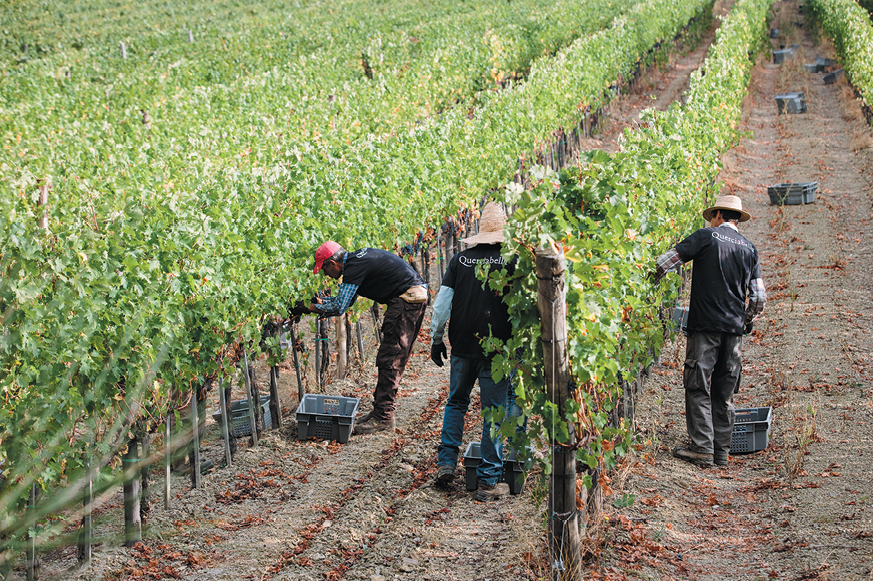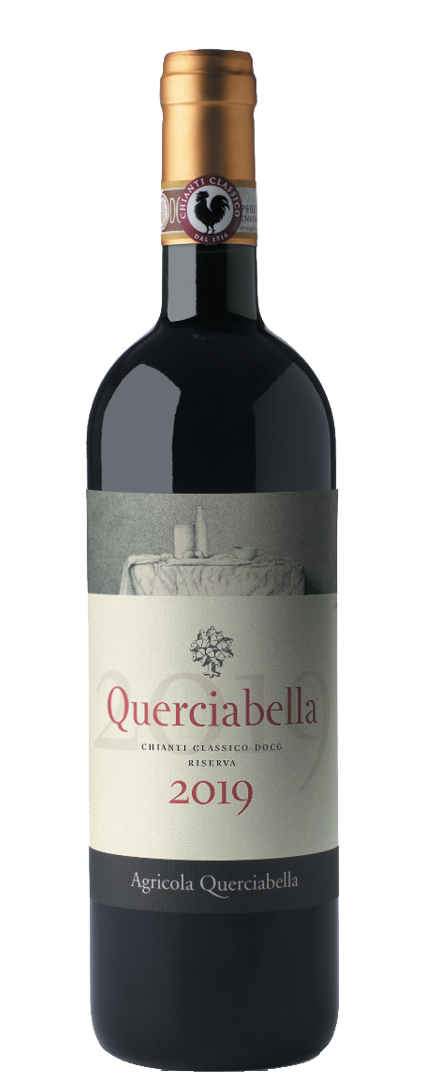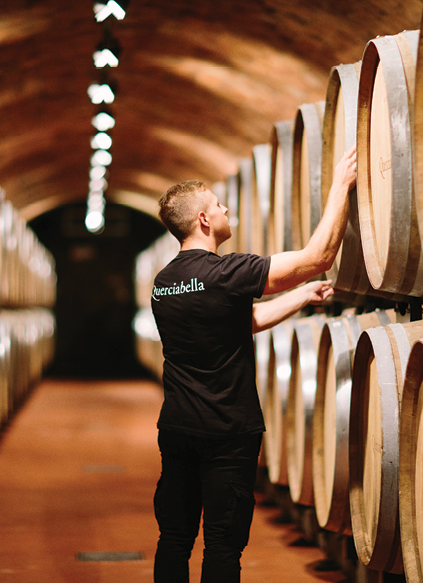- Home
- Media Kit
- MediaJet
- Current Issue
- Past Issues
- Ad Specs-Submission
- Reprints (PDF)
- Photo Specifications (PDF)
- Contact Us
- PRIVACY POLICY
- TERMS OF USE
![]()
ONLINE
![]()
ONLINE

Capturing The Essence
Of The Terroir
Editors’ Note
Emilia Marinig brings over 20 years of international experience in managing Italian Fine Wines to her role at Querciabella. With a Master’s Degree in Wine Business Administration, Marinig combines creativity with analytical skills, helping shape Querciabella’s trajectory towards unprecedented heights. As a Certified Vinitaly International Ambassador and Educator, she shares her extensive knowledge and passion for Italy’s viticulture heritage with enthusiasts around the world. Marinig is well-versed in digital strategies, keeping up-to-date with all the new developments and leveraging her expertise to enhance engagement with consumers in the digital sphere.
Winery Brief
In 1974, Giuseppe (Pepito) Castiglioni – an industrial entrepreneur and lifelong wine lover – bought a single hectare of vineyard on a Tuscan hillside and set about creating an estate that would soon span the breadth of the region. He dreamed of producing elegant, rich wines, made not only from native Sangiovese grapes, but also from those of his beloved Bordeaux and Burgundy – Cabernet Sauvignon, Merlot, Chardonnay, and Pinot Blanc, to name a few. Sebastiano Cossia Castiglioni – Pepito’s son and an investor and entrepreneur in his own right – converted the estate to organic viticulture in 1988, making Querciabella (querciabella.com) one of the first wineries in Italy to employ this practice. Today, that single hectare in Tuscany is just a small part of the 94 hectares of the Querciabella vineyards.

Harvesting grapes from a Querciabella vineyard
Will you discuss the history of Querciabella?
Querciabella might not have a century-long tradition like other celebrated Tuscan estates, but our history is certainly one of passion, innovation, and a relentless pursuit of excellence in winemaking. Founded in 1974 by Giuseppe (Pepito) Castiglioni, a visionary with a deep appreciation for fine wines, the estate was born amidst the rolling hills of Greve in Chianti. Castiglioni’s ambition was clear: to produce wines that could stand shoulder-to-shoulder with the finest bottlings in his vast collection.
Our journey towards greatness began humbly with the acquisition of a small estate in the hamlet of Ruffoli – a farmhouse surrounded by a few vineyards. From these modest beginnings, Querciabella blossomed fast, becoming one of the most appraised wineries in Chianti. Under the leadership of Castiglioni’s son, Sebastiano, who assumed the reins in the late 1990s, the estate expanded through strategic acquisitions in the Chianti Classico region and the establishment of a coastal estate in Maremma, Alberese, south of Grosseto.
Sebastiano’s leadership heralded a purpose-driven, innovative, and sustainable approach to winemaking. The estate embraced organic farming as early as 1988, preceding formal certification. In 2000, Sebastiano introduced biodynamics, and in 2010, he made another pivotal move by converting all operations to plant-based, embracing a vegan ethos that resonated deeply with our core values of ethical integrity and uncompromising quality.
In the same year, under the guidance of Luca Currado, Querciabella hired Manfred Ing, a young and very talented winemaker from South Africa. Our portfolio has thrived since then, producing wines renowned for their elegance and terroir expression. Nowadays, the estate boasts 94 hectares of thriving vineyards in Chianti Classico and Maremma. The different qualities of each vineyard are skillfully brought to life and blended to perfection to craft excellent wines sought after for their beautiful poise and rare complexity.

Will you elaborate on Querciabella’s approach to biodynamic viticulture?
At Querciabella, our philosophy centers on balance. We recognize vineyards as dynamic ecosystems intimately connected to nature’s rhythms. Since 2000, biodynamic practices have been integral to our winemaking approach, guiding every aspect of vineyard management.
While we embrace the holistic concept of harmony, we eschew the more spiritual elements, instead adopting a pragmatic approach that integrates techniques such as cover crops, herbal preparations, and meticulously planned viticultural interventions to foster biodiversity, soil health, and vine vitality, imbuing our wines with a profound sense of terroir and vitality.
Our transition to plant-based operations signifies a pioneering venture into low-impact viticulture. Beyond simply excluding animal-derived products from our vineyard and cellar practices, our vegan ethos reflects a deeper reverence for the interconnectedness of all life forms. Stripping away pesticides, additives, and unnecessary manipulations, we truly honor the sanctity of the environment, promote sustainable agriculture, and craft wines that resonate with purity, authenticity, and a profound sense of harmony with nature.
Will you provide an overview of Querciabella’s estate and wines?
Querciabella’s estate sprawls across 94 meticulously tended hectares of vineyards, nestled in the enchanting hills of Chianti and along the wild coastal beauty of Maremma. Our diverse portfolio is a living tribute to the unique microclimate, soil composition, and practices that define each of our vineyards.
From the sought-after elegance of Batàr, an epic Chardonnay and Pinot Blanc blend cherished by the world’s finest collectors, to the captivating Camartina and Palafreno, our most iconic wines exemplify precision winemaking with exquisite poise and complexity. Meanwhile, the Maremma range offers wines characterized by crispness, pleasant aromatics, and a velvety mouthfeel.
Central to what we do, of course, is the Chianti Classico DOCG range, a manifestation of meticulous craftsmanship and a deep respect for tradition. With 52 hectares of vines gracing Greve, Radda, and Lamole, Sangiovese reigns supreme, constituting nearly 60 percent of our crop. Our single-site approach, introduced in 2007, pays homage to the intrinsic qualities of this noble grape, culminating in the Querciabella Gran Selezione – a wine deeply rooted in a high-altitude vineyard above our cellars in Ruffoli.
With an unwavering focus on tension and fruit purity, each of our wines reflects the culmination of our dedication to the terroir.

Querciabella cellars
What have been the keys to Querciabella’s industry leadership?
At the core of our vision is a profound commitment to sustainability, extending beyond environmental preservation to encompass financial stability, employment fairness, and virtuous interaction with the local community. The other pillar is continuous innovation, embracing change while upholding the craftsmanship in winemaking. Through investment in research and development, we always figure out new ways to improve quality, explore new techniques, and adapt to evolving consumer preferences and environmental challenges. Our ultimate goal is to achieve excellence in every aspect by paying meticulous attention to detail, maintaining the highest quality standards, and relentlessly pursuing perfection. This commitment results in wines of exceptional quality and distinction, reinforcing our position as an industry leader.
Beyond environmental stewardship, our sustainability initiatives extend to social and economic dimensions. We prioritize fair labor practices by providing equitable wages and safe working conditions for all our employees, who mostly live locally. Furthermore, we actively engage with our community, supporting initiatives that promote education, cultural enrichment, and social empowerment.
In terms of viticulture and winemaking, we have more than demonstrated our commitment to minimizing our environmental impact across all aspects of our operations. For over 30 years, by avoiding the use of synthetic pesticides, herbicides, and fertilizers, we prioritize natural solutions that promote soil health and biodiversity, thus contributing to the overall health of our vineyards and surrounding ecosystems. We have also introduced lighter materials for our bottles and packaging, which are chemical-free and easy to recycle.
We are putting our best efforts into low-impact winemaking, and our crowning achievement will be the new state-of-the-art cellar. It will employ energy-efficient technologies and help us reduce our reliance on non-renewable resources while streamlining logistics and further offsetting our carbon footprint. Moreover, it will help cut down on heavy commercial traffic through the town center, thus enhancing the quality of life for the citizens of Greve.
Where did your passion for the wine business develop?
My endeavor in the world of wine is a rich blend of my deep-rooted passion for wine and food, academic pursuits, and dynamic personality. Hailing from a rustic enclave in Friuli Venezia Giulia, Italy, my fascination with wine took root early on. As a student, I was captivated by its extraordinary ability to capture the essence of the terroir. It spoke to my appreciation for the diverse landscapes and cultures that shape our world.
For me, wine serves as a conduit to engage both my analytical mind and my creativity. My background in marketing equips me with the capability to analyze invaluable insights into consumer behavior, market trends, and effective communication strategies – skills that proved instrumental in this competitive industry. Mostly, though, I consider wine as a catalyst for connection and conviviality. Its sensory allure fosters meaningful conversations, strengthens relationships, and creates enduring memories.
After more than two decades of international experience, wine continues to inspire and enrich my journey through life: the narrative behind each bottle leads me every time to discover a tapestry of human ingenuity, craftsmanship, and perseverance. Moreover, it has drawn me to the heart of Chianti Classico, where I assumed the role of overseeing marketing and communications at Querciabella, a prestigious winery celebrated for its unwavering commitment to quality and sustainability. I consider myself incredibly fortunate to have embarked on such a special journey.![]()